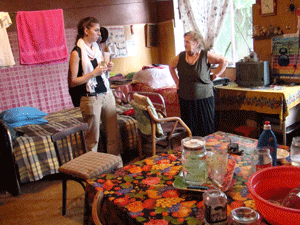Shorena Latatia, Zugdidi-Tbilisi
28 IDP families from Abkhazia have been living in the settlement near Zugdidi district hospital for many years. However, privatization of their accommodations has not started yet. Besides that, the water and fecal masses are leaking from the sewerage system for two months already and it causes terrible smell in the building. Because of the smell it is impossible to stand in the passage and rooms.
“We can understand that the accommodations cannot be privatized in this settlement but they should at least repair the sewerage system! There is anti-sanitary in the entire building. Living here is getting unbearable day-by-day,” said an IDP from Abkhazia Tsisana Kasanishvili.
IDPs are afraid that indifference to their problems is caused by their intended eviction. However, nobody has officially informed them about it yet.
Almost every resident of the settlement is unemployed. The state has not assigned agricultural plots to them and did not work out any employment programs for them either. The IDPs get more dependant to the state since they are not employed.
An IDP from Abkhazia Pupa Mania is a disable person and had heart-attacks several times. Her daughter and 6-year-old Lika Lakashia live in the accommodation with her.
“Lika weighed only 700 grams when she was born; she can neither speak nor walk. When she starts crying we know that she is hungry. I cannot buy proper food for the child with my 90-GEL pension. Several months ago, a social worker granted high points to us and we cannot get social allowance now,” said Pupa Mania.
In accordance to the Constitution of Georgia and other laws the state has duty to take care and protect socially vulnerable families. However, the point is who are socially vulnerable people for the state and how it implements its duties.
News
December 13, 2023
Ethnic minorities outside the peace dialogue
November 6, 2023
‘Peace’ agenda of political parties
Popular
Articles
February 13, 2024




